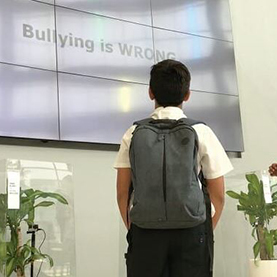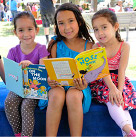We have all heard the phrase, “Actions speak louder than words” In this instance, it’s the words that have all resounding power. IKEA, the world’s largest furniture retailer, conducted a live Anti-Bullying experiment called Bully A Plant, that recorded the growth patterns of two identical plants, with very unique methods of care. This 30-day study was set to model the negative effects of verbal bullying for students and staff. While this experiment only involved plants, it speaks volumes to the power of our words and how we communicate with others.
IKEA placed two identical plants in multiple Global Education Management Systems (GEMS) schools across the United Arab Emirates (UAE) in the Middle East. Both plants were watered the same and received the same amount of sun. However, students were instructed to treat the plants differently. One plant received positive and encouraging comments daily, while the other plant received negative and hateful comments. The results were clear.

The plant that had been complimented was thriving. The plant that had been bullied for 30 days was looking very dull with droopy brown leaves.
CCRC is intent on spreading awareness on this alarming issue. During the academic year of 2015-2016, LAUSD conducted a survey that revealed the rising occurrence and effects of bullying. In the Chatsworth area alone, the following was found:
- Chatsworth Park Elementary School, 64% of students reported that bullying was a problem
- Superior Elementary School, 42% of students reported that bullying was a problem
- Ernest Lawrence Middle School, 56% of students reported that bullying is a problem
- Chatsworth High School 55% of students reported that bullying was a problem
When left unaccounted for, bullying doesn’t just affect the intended target and the children doing the bullying, but everyone who is exposed to the environment in which it occurs – most commonly at school.
Children who are bullied are more likely to:
- Have low self-esteem
- Develop depression or anxiety
- Become socially withdrawn, isolated and lonely
- Have lower academic achievements due to avoiding or becoming disengaged with school
- Be unable to form trusting, healthy relationships with friends or partners in the future
- End up becoming bullies themselves
Children who frequently bully others are more likely to:
- Drop out of, or be expelled from school
- Engage in criminal behavior
- Develop depression or anxiety
- Be abusive towards their sexual partners, spouses or children as adults
Children who witness bullying are more likely to:
- Feel powerless
- Live in fear and guilt
CCRC urges parents, caregivers and child care professionals to fight against bullying in the home and school setting. If your child or a child you know is being bullied, PBS encourages parents to do these six things:
- Avoid assumptions. The best thing you can do for a child being bullied is to listen without judgement
- Comment on changes and watch for nonverbal cues. If your child isn’t talking but you suspect that something is wrong, share your observations and watch for clues. It’s not the best time to talk to kids before or right after school
- Do not schedule a meeting with the other kid(s). The child on the receiving end is likely to feel scared when face to face with the aggressor. Organizing a confrontation before all other options have been exhausted can also break the trust between the child and the parent.
- Do ask the teacher for help. Teachers often have a firsthand experience and training dealing with these situations. If the incidents are happening in the classroom a teacher or child care provider should be the first line of defense.
- Problem solve with your child. Some kids are great with snappy comebacks, some need to walk away and many prefer use of the “buddy” system.
- Identify a touchstone. Help your child identify a safe person or place at school who can help your child if the bullying continues.
For more resources on how to prevent bullying, and help your child if they become a victim visit:
San Fernando Valley Community Mental Health Center, Inc. home to The Bullying Advocacy program. They are a bullying and school violence advocacy program that offers a toll free 24/7 hotline with live counseling by phone, resource referrals and informational/educational presentation opportunities.
Stopbullying.gov, a federal government website managed by the U.S. Department of Health and Human Services to help prevent and offering varied degrees of training on how to deal with bullying.
California State PTA, the nation’s largest volunteer-led child-advocacy association working to drive improvements in the education, health and well-being of all children and families.


